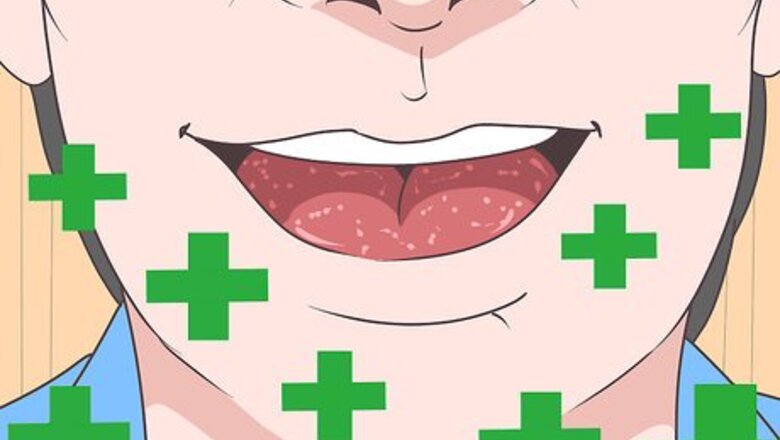
views
Replacing Negative Thoughts
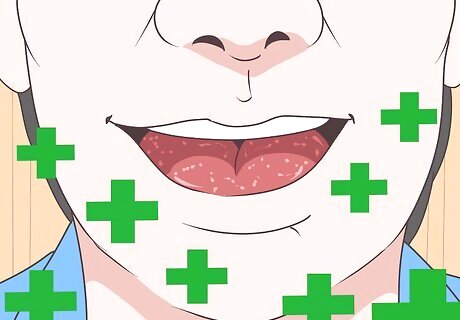
Use positive self-talk to combat negative thinking. You likely have a stream of negative thoughts flowing through your mind, which can make you feel worse. When you notice these thoughts, challenge them. Then, replace the negative thought with something positive. For instance, let's say you catch yourself thinking, “No one likes me.” Stop yourself and ask, “Why do I think that?” and “When have people shown me they like me?” You might recognize that the thought came from feeling insecure because of your depression, and you may remember all of the times over the past few weeks that someone has helped you, been nice to you, or asked you how you were doing. Finally, tell yourself, “I know people like me because they're nice to me.”Tip: Positive self-talk might be hard to do at first, especially if you're depressed. Your mind might at first resist your efforts to find positive things in your life. However, you can learn to do this if you keep practicing.
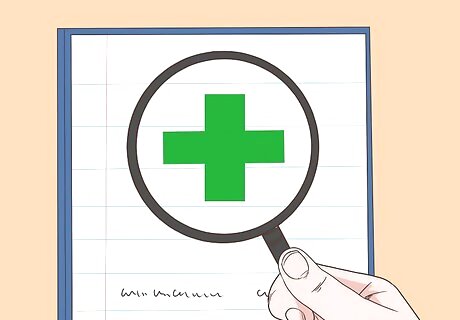
Counter negative observations with a positive one. Chances are, your depression is great at finding everything wrong in your life. This is totally normal when you're depressed! When your brain starts focusing on the negative, make a point to find something positive that's happening. Each time your brain finds a new negative thing, add another positive thing to your mental list. If it helps, write down your positive observations. For instance, let's say you're at school or work. Your brain might focus on observations like, “no one is including me in their conversation,” “there's so much time left until it's time to go home,” or “I'm not getting anywhere in life.” Instead, you could point out, “I have lots of opportunities to people-watch today,” “my day's just getting started, and I'm excited to see what happens,” and “this job/class is a stepping stone for where I want to go.”

Visualize your negative thoughts floating away. When you have negative thoughts, image that they're something concrete, like confetti. Then, picture the confetti and imagine it blowing away in the wind, leaving you forever. Breathe deeply, picturing yourself at peace. For example, let's say you had the thought, “I'll never reach my goals.” You might picture yourself balling up that thought. Then, throw that thought and imagine a strong wind carrying it away.Variation: As an alternative, you might visualize your negative thoughts washing away. For instance, you might imagine that each thought is a stone. Then, picture yourself throwing those stones into the sea, where they flow away.

Write down your worries or “to do” list to get them off your mind. Although it's normal to have worries or things you want to get done, your depression can make it impossible to think about anything else but these problems. To keep them from weighing on your mind, jot them down on a notepad or a list in your phone. This may help you stop thinking about them. Keep 2 different lists to separate the things you can do something about from the things you can't help. For instance, you might add “fold the laundry” to your to do list. However, if you're worried someone you know is ill, that might go on the worries list, since you can't really do anything about it. When you have time, try to do the things on your to do list.
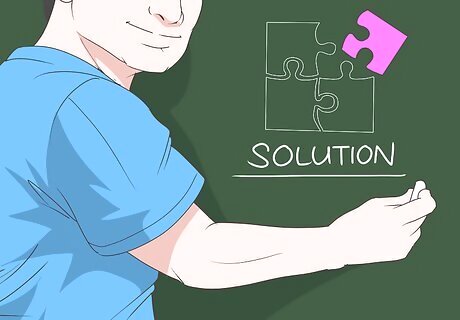
Look for solutions instead of thinking about your problems. It's easy to see what's wrong when you're feeling depressed, but finding a solution might seem impossible. Don't accept that for an answer. Instead, list every possible solution to the problems you encounter, even if they seem a little far-fetched. This will help your mind start to see possibilities instead of problems, which can help you think more positively. For example, let's say your problem is that you feel lonely on a Saturday night. Instead of dwelling on it, you might start listing activities you can do, like watching a movie, going shopping, calling a friend, making a necklace, or chatting in an online forum. Similarly, your problem might be that you're worried about not having money for your bills. Think of ways you can make a little extra money, people who might let you borrow money, things you might be able to sell, or ways you can cut back. Additionally, you might look up things you can do for fun that are free or browse job listings to see if there's a better job you could apply for.
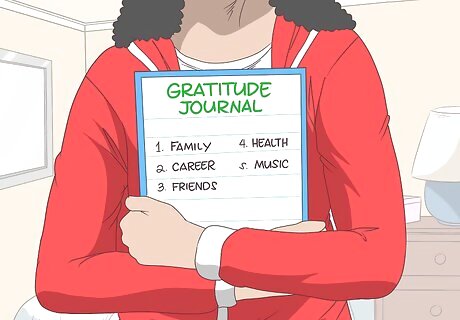
Keep a gratitude journal to remind yourself what's good in your life. Depression can make it hard to see the good things in your life, so feeling grateful might seem impossible. Try your best to think of at least 3-5 things you're grateful for everyday, even if they're small. Add to your list every day so that you can go back and read over all of the great things in your life. For instance, you might be grateful for your cat, sunny weather, peppermint tea, a cozy bed, and your best friend. It's okay if there's repetition on your list.Tip: It's really helpful to invest extra time in your gratitude journal when you aren't feeling depressed because it's much easier to find blessings in your life. This allows you to have a really long, comprehensive list of good things in your life to look over when you do get depressed.
Boosting Your Mood

Watch a funny TV show or movie. Humor helps you feel happier and may temporarily improve your mood when you're depressed. Turn on your favorite TV sitcom or laugh-fest movie, or search your favorite streaming service for something new. Soon, you'll be laughing your cares away. Comedies are a great option, but you might also try a stand-up comedy special. Stay away from dramedies or movies that make you “feel” something. Just go for pure laughs!

Exercise for 30 minutes to release feel-good hormones and distract yourself. When you exercise, your body releases endorphins that make you feel better. When you feel good, it's much easier to think positively. Additionally, exercise can take your mind off of what you're feeling, which can temporarily lift your spirits. For instance, you might go walking, running, swimming, dancing, or cycling.Variation: It can be really hard to get motivated to exercise when you're depressed, and you may have zero energy. If this is the case for you, set the bar really low. Go for a walk around the block, or try to move along with your favorite music. As another alternative, you might try a few gentle yoga poses.

Engage in a hobby that gets you moving. Doing something that involves slow, gentle movements can also trigger your happy hormones. Also, it will give you a sense of purpose and accomplishment, which will help you feel better. Schedule time each day to do your hobby so that you can see the benefits. For example, you might try gardening, bird watching, cooking, fishing, carpentry, and photography, which all get you moving around. This is a great alternative if exercise just seems like too much. However, it's even better to do your hobby in addition to exercise.

Make something creative to release your emotions. Being creative can help you deal with your depression because it's a great way to work through your feelings. Plus, the act of creating can improve your mood, and the things you make will give you a sense of accomplishment and satisfaction. Try to do something creative most days of the week. For example, draw, crochet, paint, sing, play an instrument, make crafts, write poetry, or write a story. Don't worry about making something good. Just let your creativity flow.

Turn on your favorite happy tunes. Listening to music can have a huge effect on your mood, so use it to your advantage. Make a playlist of happy songs or choose your favorite upbeat albums. Then, listen to music to help get you in a positive mindset. When you're feeling depressed, you might really want to stick to sad music, and that's normal. However, listening to something with a higher tempo and upbeat mood will help you feel better.
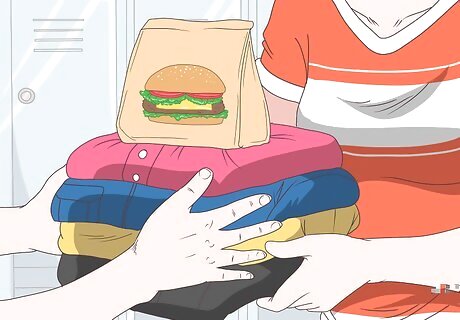
Do something nice for someone else. Buy someone a coffee, give money to someone in need, volunteer, or do someone a favor. These actions will help you remember your own abundance in life, and they'll give you a sense of purpose and pride. Try to do something small for someone else every day. Adopt a “pay it forward” attitude by doing something nice every day in the the hopes of triggering a wave of kindness. For instance, when getting your morning coffee, you might pay for the person behind you.
Making Positive Changes
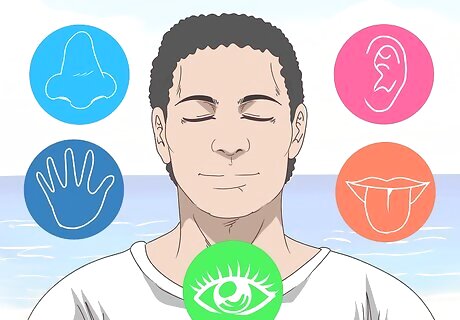
Use mindfulness to help you stay in the present moment. Being mindful means keeping your mind in the present, which helps you reduce your worries about the future and your ruminations about the past. To ground yourself in the moment, engage your 5 senses. Additionally, focus on the environment where you are and the actions you're taking. Stop and notice things you're experiencing through each of your senses of sight, hearing, smell, touch, and taste. You might think to yourself, “I see the table set for dinner with food spread out to enjoy, I hear my cat meowing for a taste of the meal, I smell the scent of lasagna and garlic bread, I feel the warmth radiating off of the food, and I taste the sweetness of tomatoes.”

Make yourself do things you enjoy, even if you don't feel like it. Depression may make you feel like you don't want to do anything, but doing things you love can help you break out of your depressed mindset. Although it may take time and repetition, forcing yourself to have fun can improve your mood and make you think more positively. Every day, do at least 1 thing you like to do. Ask your friends or family members to help you stick to your goal of doing something fun every day. For instance, you might go out for coffee, see a movie, go bowling, go to a dance class, do improv, make art, go for a hike, go to a sporting event, or visit a museum.

Spend time with your friends being social. Although your depression may make you want to hole up at home, going out is actually helpful for improving your mindset. Social outings are important for your wellbeing, and, although getting out may seem impossible, they can lift your spirits if you make yourself go. Just do your best to spend more time with others. If going out is impossible, invite a friend or 2 over to spend time with you. You might watch a movie, play a game, or just chat. Don't worry about cleaning up or taking a shower. Your friends don't care about those kinds of things.Variation: Playing or snuggling with your pet may provide similar benefits to spending time with your friends.

Work with a counselor to help you practice new ways to stay positive. Depression is a serious mental health condition, so you might not be able to think more positively on your own. Fortunately, a therapist can help you address your negative thoughts and learn ways to replace them with positive thoughts. Additionally, they can help you process your emotions and set goals for your recovery. You can find a counselor online or by getting a referral from your doctor. Your insurance may cover therapy appointments, so check your benefits before you go.















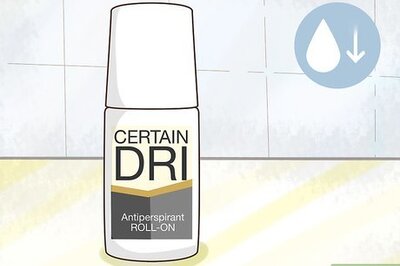



Comments
0 comment